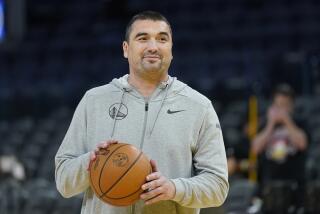Yugoslavia’s Milosevic Juggles Crises
- Share via
BELGRADE, Yugoslavia — The rumors flooding this city and dominating conversations at cafes, embassies and newsrooms are almost as seamy as the stuff coming out of Washington these days.
Marko Milosevic, son of Yugoslav President Slobodan Milosevic, is the central figure in a tale of sex, guns, jealousy and rage.
“Milosevic hospitalized!” the newspaper headlines scream. “Victim of a cuckold?” they ask.
Nothing has been confirmed or denied, and it won’t be. But that doesn’t seem to matter in a country where economic and institutional decay is so widespread that dissecting the shenanigans of the first family is a perfectly acceptable pastime.
This first family is easy prey. Son Marko, 24, is known for racing cars through city streets, terrorizing people who he thinks crossed him, and he recently dyed his hair yellow. Daughter Marija runs a discotheque and used to date a convicted murderer. Wife Mirjana Markovic is an eccentric, die-hard Communist who lusts after power.
The real target, of course, is Milosevic himself, whose Yugoslavia, after half a decade of secessionist wars, today is made up only of Serbia and the smaller republic of Montenegro. He somehow manages to survive crisis after crisis; a shrinking political base; and an economy that is sending Yugoslavia to the bottom of the Balkan barrel.
By any objective measure, Milosevic is in trouble.
Six months after he stepped down as president of Serbia to become president of Yugoslavia, his handpicked successor has not been able to form a government. Milosevic’s Socialist Party failed to win a majority in parliament last year and is forced into the position of having to seek partnership with an opposition party.
No deal has been struck, however, and the dominant Serbian portion of the country putters on without a functioning government, as catastrophe looms on several fronts:
* A blood bath could be unleashed at any moment in Serbia’s Albanian-dominated province of Kosovo. A small but persistent band of armed Albanian separatists, after staging dozens of attacks on Serbian police stations and authorities, is gaining strength. Milosevic is believed to be planning a ferocious crackdown in the region.
Serbian police blockades have popped up in parts of Kosovo, and new conscription notices recently went out to young men in several Serbian cities.
* Serbia’s last Yugoslav partner, Montenegro, is in open revolt.
Businessman and politician Milo Djukanovic, a determined critic of Milosevic who is demanding more independence for his tiny republic, was elected president last fall.
He defeated Milosevic’s ally, Momir Bulatovic, who staged riots in an attempt to disrupt Djukanovic’s inauguration Jan. 15. More than 50 people were injured.
In the weeks since, Milosevic has stepped up pressure on the Djukanovic government by deploying police and customs agents along the once-open border between Serbia and Montenegro. This has effectively strangled commerce and trade in and out of Montenegro. And mysterious car bombs have targeted two of Djukanovic’s key security officers.
* Before stabilizing this week, the national currency, the dinar, plunged to a record low against the German mark, losing about a third of its value. Some panic buying was reported at local grocery stores amid fears of a return to Yugoslavia’s chaotic days of hyperinflation.
While senior officials get rich, the government is broke.
At U.S. insistence, limited sanctions that bar Yugoslavia from obtaining loans from international institutions such as the World Bank will not be lifted until Belgrade improves its record in democracy and human rights, especially in Kosovo.
*
Milosevic weathers these storms largely because the political opposition, which soared during demonstrations a year ago, has fallen into backbiting disarray. The one successful opposition politician is a right-wing extremist. Most world capitals refuse to deal with him. And Milosevic still controls the key levers of power: police and state media.
“In a politically and economically reduced country such as the [rump Yugoslavia], where virtually no institution is functioning, Milosevic reckons he can continue to rule without any obstacles,” analyst Bratislav Grubacic said. For now, he noted, no one has come up with an alternative.
More to Read
Sign up for Essential California
The most important California stories and recommendations in your inbox every morning.
You may occasionally receive promotional content from the Los Angeles Times.













